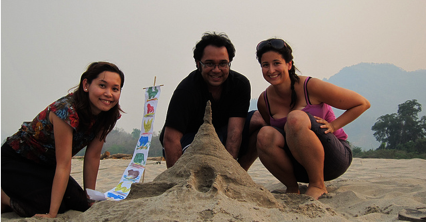
CASE #52: Yen-shou’s Sand Stupa
Master Yen-shou of Yung-ming once summarized for his students the Expedient Means chapter of the Lotus Sutra:
Even if you recite the buddha-name with a scattered mind or praise Buddha in a low voice, or scratch out a picture of the Buddha with your fingernail, or make a stupa out of a pile of sand, and thus gradually accumulate merit, all of you have achieved enlightenment.
BACKGROUND:
Yen-shou of Yung-ming The Ch’an monk and Pure Land practitioner Yung-Ming Yen-Shou (905-975) was the key figure in the synthesis of Ch’an and Pure Land Buddhism in China. He taught that the Pure Land was the realm of the Purified Mind, rather than an actual realm many light years to the west of this world, as traditionally taught in the Pure Land Sutras. He is said to have been a military official who converted from Confucianism to Buddhism.
Recite the buddha-name Refers to the Pure Land practice of nien-fo—reciting Namo-omito-fo, Amida Buddha’s name. A simple devotion, performed by laypeople and monastics alike, it could be used to express simple faith or to enter deep samadhi, and often both at once.
Expedient Means chapter… The Sanskrit term upaya, sometimes translated as “skillful means,” is the subject of the second chapter of the Lotus Sutra. According to Burton Watson, it refers to “a device or temporary means adopted in order to relieve suffering and bring beings to enlightenment, often by offering provisional teachings as a means of guiding them to the truth.” The Lotus Sutra stresses that there are myriad expedient paths to enlightenment but cautions its readers not to cling to any one method as the final word. The most famous example of upaya in the Lotus Sutra states that even a child’s stupa made of mud or sand may be the karmic cause of enlightenment.
NOTE: The Lotus Sutra teaches the oneness of samsara and nirvana. In ecological terms, this means that this world and the world of enlightenment are identical. Upaya may therefore be reinterpreted as “those beliefs, practices, rituals, or ideals which lead to a sustainable (or “enlightened”) human presence in this world, rather than the next.”
COMMENTARY:
If you gradually accumulate merit, all of you have achieved enlightenment. What can that mean? How can enlightenment be gradual and, at the same time, already achieved?
Reciting Namo-omito-fo, doodling a Buddha with a nail, making a Buddhist sand castle on the shore—the list could go on and on. Are they an arrow pointing to the future, or the stone that marks the way? Maybe that’s why the sutra tells us they all work—and that none of them do.
VERSE:
There once was a monk from Bodhgaya
Who decided to master Upaya.
He set out on the path
Got as far as Sarnath,
But never arrived at Bodhgaya.
Find all the Green Koans here.
Image via krustacean (Flickr)